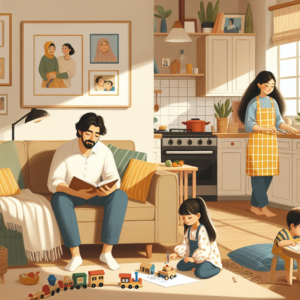Unraveling the Marriage Equality Debate: A Clash of Rights and Beliefs
[caption id="attachment_35120" align="alignnone" width="904"] Family Life[/caption]
The debate surrounding marriage equality has evolved significantly over the past few decades, reflecting broader societal changes regarding LGBTQ+ rights and acceptance. As nations grapple with the implications of legalizing same-sex marriage, the clash between individual rights and deeply held beliefs continues to shape public discourse. This article seeks to unravel the complexities of the marriage equality debate by examining its historical context, legal landscape, cultural perspectives, religious arguments, personal narratives, and potential pathways toward inclusivity.
Understanding the Historical Context of Marriage Equality: A Timeline of Key Events
The journey toward marriage equality has been marked by pivotal moments that have shaped public perception and legal frameworks. In the United States, the movement gained momentum in the late 20th century, with the first legal recognition of same-sex marriage occurring in 2004 in Massachusetts. This landmark event sparked a national conversation, leading to a series of state-level legal battles and referendums. Globally, countries like the Netherlands became the first to legalize same-sex marriage in 2001, setting a precedent that would inspire others. The U.S. Supreme Court's 2015 ruling in Obergefell v. Hodges, which affirmed the constitutional right to marry for same-sex couples, marked a significant victory for LGBTQ+ advocates. As of 2023, over 30 countries have legalized same-sex marriage, illustrating a growing recognition of marriage equality as a fundamental human right.
The Legal Landscape: Analyzing Landmark Court Cases and Legislation
The legal framework surrounding marriage equality is complex and varies significantly across jurisdictions. Landmark court cases have played a crucial role in advancing the rights of same-sex couples. In addition to Obergefell v. Hodges, cases such as United States v. Windsor (2013) challenged the Defense of Marriage Act, which denied federal recognition of same-sex marriages. Internationally, cases like the Constitutional Court of South Africa's ruling in 2005 and the German Federal Constitutional Court's decision in 2017 have also contributed to the legal recognition of same-sex unions. Legislative measures, such as the Marriage Equality Act in Australia, have further solidified these rights. However, ongoing legal challenges and attempts to roll back these protections highlight the fragility of marriage equality, necessitating continued advocacy and vigilance.
Cultural Perspectives: How Beliefs Shape Views on Marriage Equality Globally
Cultural attitudes toward marriage equality are deeply influenced by societal norms, traditions, and values. In many Western nations, there has been a notable shift toward acceptance, driven by increased visibility of LGBTQ+ individuals and advocacy efforts. Conversely, in regions where conservative values dominate, such as parts of Africa and the Middle East, same-sex relationships are often criminalized, and marriage equality remains a distant prospect. This cultural divide is further complicated by generational differences, with younger individuals generally exhibiting more progressive views on LGBTQ+ rights. Understanding these cultural contexts is essential for fostering dialogue and promoting acceptance, as beliefs about marriage equality are often intertwined with broader issues of human rights and social justice.
The Intersection of Religion and Marriage: Faith-Based Arguments in the Debate
Religion plays a significant role in shaping opinions on marriage equality, with various faith traditions offering differing perspectives. Many conservative religious groups argue that marriage should be defined as a union between one man and one woman, citing scriptural texts as the foundation for their beliefs. Conversely, progressive religious organizations advocate for inclusivity, arguing that love and commitment should be celebrated regardless of sexual orientation. This divergence has led to contentious debates within faith communities, often resulting in schisms and the formation of LGBTQ+-affirming congregations. The challenge lies in reconciling deeply held religious beliefs with the principles of equality and human rights, necessitating ongoing dialogue and understanding among diverse faith groups.
Voices from the Community: Personal Stories and Experiences of LGBTQ+ Individuals
Personal narratives from LGBTQ+ individuals provide powerful insights into the impact of marriage equality on their lives. Many recount experiences of discrimination, rejection, and the struggle for acceptance within their families and communities. For some, the ability to marry legally has been a transformative experience, symbolizing recognition and validation of their identities and relationships. Stories of couples who have fought for their right to marry often highlight the emotional and legal hurdles they faced, as well as the joy and fulfillment that marriage brings. These personal accounts underscore the importance of marriage equality not just as a legal issue, but as a deeply personal matter that affects the lives of countless individuals and families.
Moving Forward: Strategies for Bridging Divides and Promoting Inclusivity in Society
As the marriage equality debate continues, it is essential to explore strategies for bridging divides and fostering inclusivity. Education plays a crucial role in dispelling myths and misconceptions about LGBTQ+ individuals, promoting understanding and acceptance. Community engagement initiatives, such as interfaith dialogues and LGBTQ+ advocacy programs, can help build bridges between differing perspectives. Additionally, leveraging social media platforms to amplify diverse voices and stories can create a more inclusive narrative around marriage equality. Policymakers and advocates must work collaboratively to ensure that legal protections are upheld and expanded, while also addressing the underlying cultural and religious tensions that contribute to division. By fostering open dialogue and mutual respect, society can move toward a more inclusive future for all individuals, regardless of their sexual orientation.
The marriage equality debate is emblematic of broader struggles for human rights and social justice. As societies navigate the complexities of individual rights versus collective beliefs, it is crucial to recognize the importance of inclusivity and understanding. By examining the historical context, legal landscape, cultural perspectives, and personal stories, we can better appreciate the multifaceted nature of this debate. Moving forward, a commitment to dialogue, education, and advocacy will be essential in bridging divides and ensuring that the rights of all individuals are respected and upheld.
